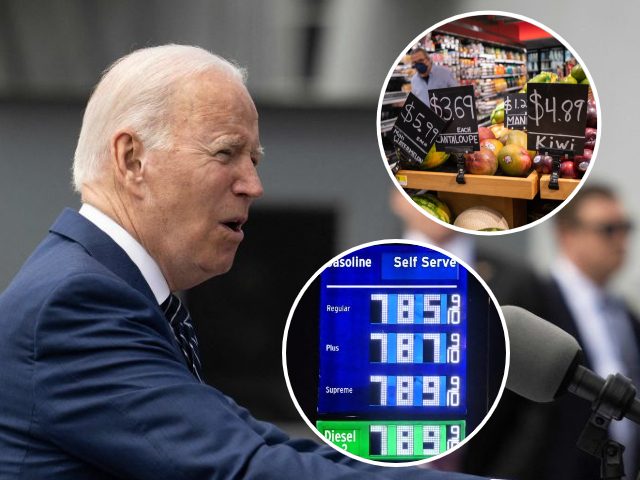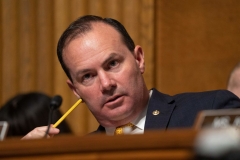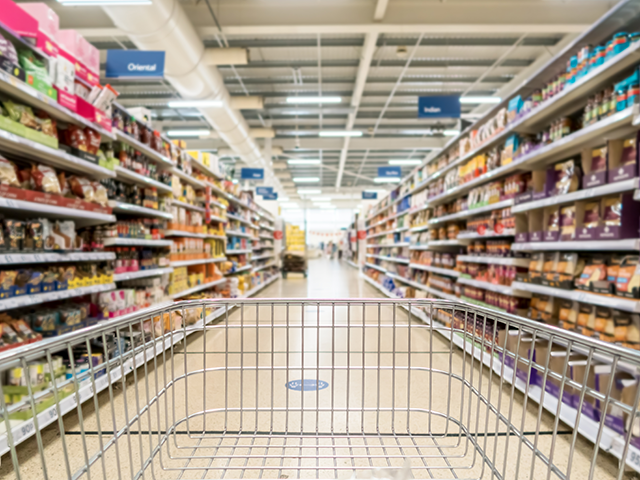VIDEOS:
"Tomorrow The Fed Starts A Mortgage Crisis Where Banks & Government Foreclose Homes" - Peter Schiff
https://www.youtube.com/watch?v=TZb9WA8NTus
Hassett warns of 'scary' October for US economy
Poll: 71% of Workers Are Poorer Under Biden’s Inflation, up from February’s 58%

Seventy-one percent of employees are poorer under the weight of President Joe Biden’s inflation, up from 58 percent in February, a Bank of America-sponsored survey shows.
The poll, revealed by CNN on Tuesday, sampled individuals in July who have 401(k) plans. Half of those sampled said they had taken measures to “cope” with Biden’s soaring prices in the last six months. Sixty-two percent said they are “stressed” about their personal finances despite being employees.
From year to date, consumer prices soared 8.3 percent in August, the Bureau of Labor Statistics revealed in September. In June, inflation reached a 40-year-high at 9.1 percent, just above August’s numbers. The price of food at home jumped 0.7 percent compared with the previous month. Over the past 12 months, grocery prices have gone up 13.5 percent.
Biden’s inflation, fueled by massive spending and arbitrarily placed constraints on the economy during the pandemic, is not just impacting low-income families. The poll found only 44 percent of employees believe they are financially well off under Biden’s leadership, down from 57 percent in February.
According to polling over the weekend, 61 percent say Biden’s economy is in a recession. Sixty-seven percent believe it is Biden’s fault the United States is on the wrong track.
iden’s sagging economy, the number one issue among voters, will impact the midterm elections. It still remains likely Republicans win back the House, but the Senate is a tossup.
Senate races in Pennsylvania, Arizona, Wisconsin, and Nevada have tightened within the margin of error. In Ohio, Georgia, North Carolina, and Florida, Republican candidates still hold leads. New Hampshire appears to be the only swing state where Democrats have the largest advantage over Republicans.
Follow Wendell Husebø on Twitter @WendellHusebø. He is the author of Politics of Slave Morality.
Sen. Mike Lee: ‘The Average Utah Family Now Spends an Additional $925 a Month More on Their Basic Monthly Household Expenses’

(CNSNews.com) - The annual inflation rate for the U.S. is 8.3 percent for the 12 months ending August 2022, but if you measure inflation from the day President Biden took office, it’s between 13 and 15 percent, Sen. Mike Lee (R-Utah) said Sunday.
Lee told Fox News’ “Sunday Morning Futures” that inflation is “actually much more bleak” than what the numbers suggest.
“Throughout most of the country if you measure inflation from the day Joe Biden took office, the very beginning of his presidency, and you measure it up until now, the number is actually between 13 and 15%. In Utah, it's more like 15%,” he said.
“The average Utah family now spends an additional $925 a month more on their basic monthly household expenses than they did on day one of Joe Biden's presidency, and so this is hurting American families badly,” the senator said.
“As to what we can do to stop it, to channel the words of Milton Friedman, Washington just needs to stop spending money. Milton Friedman beautifully when he said in the United States of America, inflation has one source and it’s Congress spending too much money,” Lee said.
On budget negotiations to fund the federal government, the senator predicted that Congress will “get right up to the moment of a decision and a whole lot of people will sign on to a bill that they’ve never seen, that they’ve never read.”
“It may have all sorts of extraneous funding attached to it with the continuing resolution, but they will say because we are this close to the deadline we have to pass at this time. What is sad, Maria, is that this is what happens every single time. It’s as if Lucy is moving the football every time, but we’re convinced she's not going to,” Lee said.
Congress “should be debating, discussing and having the opportunity to amend these spending bills for weeks if not months in advance of the spending bill deadline,” he said, “but instead the Senate and the House leadership conspired to bring it up at the last possible minute, thus assuring that the American people's priorities are sacrificed.”
“We keep getting hoodwinked because too often we agree in advance that we’ll vote for whatever has happened. This process will continue until it no longer works, and it will not stop working until you have Republicans drawing some lines in the sand,” the senator said.
“Look, this is one of the reasons why I wrote a letter that’s been signed by 14 Republican senators so far. I’m inviting more to join us, calling for more or less what you described a moment ago, which is a clean continuing resolution that will take us into the next Congress and thus allow Republicans to set the agenda, Republicans to reclaim border security, and so that we can avoid a massive omnibus spending frenzy during the lame-duck session of Congress - a period of time in which we hope to be at a stage where we’ve just retaken the majority in the House and I hope in the Senate as well,” he said.
If Republicans regain control of the Senate, they can stop Democratic priorities like hiring 87,000 new IRS agents by withholding federal funds, Lee pointed out.
“In future years we could withhold spending, withhold federal funds to implement those projects. They require funding, and I think it is important that we utilize any negotiation power that we might acquire in this election to do precisely that. Look, the American people don't want 87,000 new IRS agents,” the senator said.
“And while the American people are concerned certainly about the situation in Ukraine, they don't want us to ignore the border problems we’re solving here, and meanwhile, obsess over border problems in other countries while doing nothing right here at home,” he said.
15 Reasons Why Your Grocery Bill Is Sky-high Right Now
Inflated Food Prices Forcing American Families to Change Eating Habits

Surging food prices due to historic inflation are forcing American families to adjust their eating habits by choosing cheaper options.
Cutting back on buying meats, shopping at high-end grocery stores, and dining out are among the many ways consumers are trying to save extra cash to avoid financial instability.
One Massachusetts father, Rick Whitman, told CNN that his family was enjoying eating at home more frequently because of how expensive eating out can be but is now grappling with the reality that eating at home is also becoming pricey.
Whitman noted he was spending 25 percent more for family groceries, forcing him to shop at cheaper grocery stores, such as Costco and local chain Market Basket, instead of Whole Foods or Stop & Shop.
Food prices have not only increased for the Whitman family but for the nation, as the consumer price index shows grocery store prices have increased by 13.5 percent since last year under the Biden administration, per the Bureau of Labor Statistics. Overall, food prices have increased by 11.4 percent.
Polling has shown that 63 percent of American families with children are changing their eating habits, compared to 31 percent that are not, Breitbart News recently reported.
Seventy-two percent of families with children recorded paying more at the grocery store for items such as eggs, milk, butter, and bacon.
Another family also highlighted that current food prices had forced them to significantly adjust their eating habits by cutting down on dinner gatherings they used to enjoy hosting at their home.
“Before, we at least found joy in being home and having friends and family over, cooking and sitting around the table and just being content,” said Carol Ehrman from Montana. “Now, I’m not entertaining at all. It’s really sad.”
She noted that her family is trying to save money by cutting back on meats and is buying bulk foods more often.
Even if changing habits requires only giving up certain simple pleasures, it can still be jarring to any family, William Masters, a nutrition science and policy professor at Tufts University, told CNN.
“Not being able to buy the foods that people are used to — that your children are asking for, that your family wants — that’s a really hard thing,” said Masters.
You can follow Ethan Letkeman on Twitter at @EthanLetkeman.
No comments:
Post a Comment